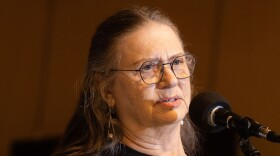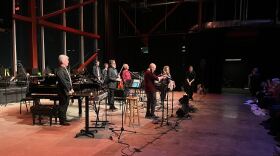Fifty years ago, the Stonewall riots in New York’s Greenwich Village kicked off the modern pride movement. But eight years before that, the patrons of an unassuming gay bar in Milwaukee took a stand against intolerance and disrespect.
"The fact there was a sizeable LGBT community that was large enough to have their own spaces and large enough to fight back when those spaces were endangered, shocked Milwaukee like nothing else," says historian Michail Takach.
On Saturday night, Aug. 5, 1961, four servicemen went looking for trouble at the Black Nite bar — one of four LGBT bars in the neighborhood of 400 N. Plankinton Ave. But before we get to the brawl itself, it's important to understand the history of the bar and its neighborhood.
The Black Nite, the Riviera, the Fox Bar and the Crystal Palace no longer exist. The neighborhood was demolished for freeway expansion. At the time, these bars were outlaw places, according to Takach. It was not only illegal to serve homosexuals liquor in Wisconsin, it was also illegal to allow them to congregate on bar premises. Violating these laws could cost bar owners their licenses and bartenders their reputation.
READ: 'LGBT Milwaukee' Showcases A Once Hidden History

Takach says that during a time when LGBT bars had to be hidden, the Black Nite stood out.
"The Black Nite throughout 1961 became a bit of a famous place because it wasn't a straight bar that allowed people of LGBT origin into the building. It was a LGBT bar that might allow straight people into the building — and this was something new for Milwaukee," he explains.

Takach notes the bar's fame and embracing atmosphere is thanks, in large part, to: Wally Whetham, a former Kohl's Food Store butcher and family man who took over the tavern in 1959, and Josie Carter.
"I have to say Josie was one of the most remarkable people I've met in the entire time I've been researching LGBT history in Wisconsin," he says. "She lived her life really socially as a gender non-conforming person of color at a time when this was unthinkable."
Whetham, Carter, and Carter's husband who was the Black Nite bouncer, would be the first to defend their territory at the Black Nite.
The Brawl
Now, back to that Saturday night on Aug. 5, 1961. That night, four 20-year-old Navy servicemen partying near Brady Street went to the Black Nite on a dare. After refusing to show identification, they were forcibly removed by the bouncer. The servicemen then jumped the bouncer. That's when Josie Carter grabbed two beer bottles and went outside to help fend off the attack, knocking out and sending two of the men to the hospital, according to Takach.
The servicemen went back to the Brady Street bar, but then decided to go back to the scene of the fight.
"They decided they were going to round up some guys and go down and clean up the Black Nite for putting their friends in the hospital. And this was probably the dumbest decision these four guys had ever made in their life," says Takach.
When they went the first time, the bar just opened and only three people were there. When they went back, the bar was at full capacity with over 70 people. And each one knew what happened earlier because Josie Carter told them how she defended her husband.
"They thought that they were in for an easy fight. But they opened the door and said something along the lines of, 'C'mon you sick faggots!,' and every single person in the bar looked at them and that was it," says Takach. "It was down. The music stopped, and the battle was on."

Everything in the bar was destroyed — every bar stool, every bottle, the jukebox, the piano. People were even thrown through windows. In the end, the police came and took everyone away except the patrons of the Black Nite.
"In fact, the police came down and told Josie, 'These people have no business harassing you and we will take care of this for you,' " says Takach. "I marveled at this story and thought this can't possibly be the way it went down, but it is exactly the way it went down."
In fact, what's remarkable about the Black Nite brawl is that it wasn't just a matter of people fighting back against violence, says Takach. "It was a matter of people fighting back against their turf being invaded, disrespected, and vandalized. This was their space and they had fought long and hard to get it," he explains.
The four servicemen were charged. But the charges were reversed by a judge, saying there wasn't enough evidence noting they started the fight, "which at the time was laughable and really remains laughable today," says Takach.
So, while the servicemen got off with physical injuries and no legal action, the Black Nite fared worse. Wally Whetham was pressured to change the bar's name, shut it down, and make it a straight bar — all of which he refused to do until forced by the Common Council. Whetham did change the name to Bourbon Beat, which remained until 1966. Eventually the bar was torn down, as the neighborhood declined. But Takach says the legacy remains even if the building doesn't.
"It really could be said that the Black Nite brawl in many ways is the birthplace of LGBT pride in Milwaukee. Because before that, people were laying down and taking the abuse, and the brawl was the first time people fought back," he explains. "...We'd really be in a different Milwaukee today if not for this incident and you really have to hand it to someone like Josie Carter who was living in a time of great marginalization."
PrideFest Milwaukee opens at the Henry Meier Festival Grounds Thursday and runs through Sunday. There you will find the History Exhibit — a permanent archive from the collections of the Wisconsin LGBTQ History Project, which Michail Takach helped curate. This year's exhibit will also celebrate the 50th anniversary of the Stonewall Riots.






